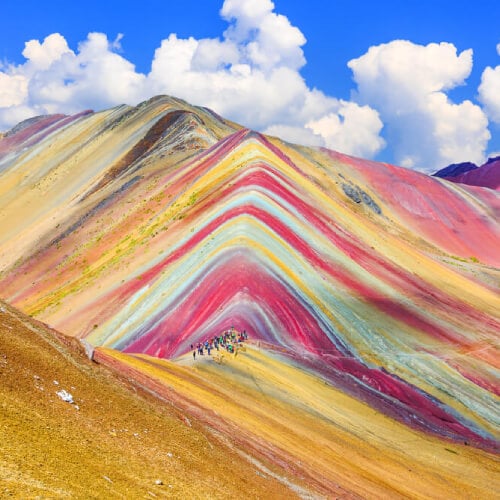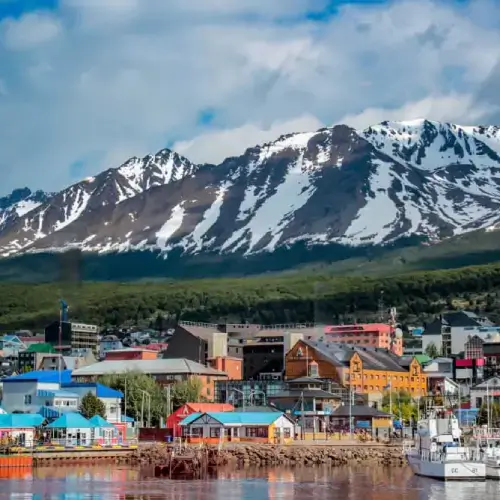Home / Compare Travel Insurance / Travel insurance for Sou…

Key takeaways
From Santuario de las Lajas in Colombia to the world’s largest salt lakes in Bolivia, there’s plenty to see and do in South America. However, it’s a good idea to get travel insurance for any overseas trip you plan to take, and here’s why:
- Travel insurance can help financially protect you from the unexpected and provide peace of mind by offering access to 24/7 emergency services.
- There’s always a chance of an airline losing your luggage or your phone being pick-pocketed, but by planning ahead with a travel insurance policy, you may be reimbursed for the value of your belongings, up to certain limits.
- If you’re keen for adventure, you need to prepare for if things go wrong. If a serious injury disrupts your trip, you may need emergency medical evacuation and to cancel the rest of your plans – which could set you back hundreds of thousands of dollars if you aren’t covered.
Do I need travel insurance for South America?
No matter your destination, it’s always a good idea to consider getting travel insurance for your trip. South America is a huge continent brimming with possibilities — which means, there’s also a lot of potential for things to go wrong.
A travel insurance policy may reimburse you for some of the expenses that occur when your trip gets disrupted. That’s why it’s important to choose not just any travel insurance policy, but one that matches your itinerary and personal circumstances to help ensure you have the cover you need.
Expert tips for choosing the right travel insurance for South America
Before purchasing your travel insurance for South America, check out these top tips for choosing a suitable policy from our Executive General Manager of General Insurance, Adrian Taylor.

Compare and purchase cover in advance
If your trip gets grounded before your plane even takes off, a comprehensive travel insurance policy may offer cancellation cover for pre-booked tours, accommodation or passes, provided you purchased your cover as soon as you booked and your reason for cancelling wasn’t a foreseen event.
Don’t get caught out by pre-existing medical conditions
Declare any pre-existing medical conditions to your insurer when purchasing a policy, as they will assess whether they can cover your conditions, and if it will cost an additional premium. As not all South American countries may have the same level of health care as found in Australian facilities, this is crucial, especially if you need to be transported to a better medical facility, which can be expensive.
Look for the COVID-19 icon when comparing
When using our travel insurance comparison service, look for the COVID-19 (coronavirus) icon when comparing to identify which policies offer COVID-19 cover. In many cases, this cover will only be available through an insurer’s top tier or comprehensive cover.
What should my travel insurance for South America include?
Some features and benefits are typically included in travel insurance policies for South America, while others can be purchased as an add-on. All this information can be found in your policy’s Product Disclosure Statement (PDS). You can also read the Target Market Determination (TMD) to check your suitability for a policy.
Cover for medical expenses

South America generally has more affordable health care than other continents, and its health care system has improved significantly over recent years. Emergency medical assistance is free for citizens and visitors in many countries in South America, such as Brazil and Argentina, but ongoing or less urgent medical treatment may not be covered. Medical costs can get expensive depending on the injury or illness, particularly if the condition is complicated or life-threatening.
Depending on your insurer and your level of cover, your travel insurance medical cover may include:
- Injuries and illnesses
- Hospital treatment
- Medical evacuation
- Repatriation
- 24/7 medical emergency assistance.
Having adequate medical cover to cover medical expenses in South America can provide peace of mind.
You should also consider seeking medical advice from a licensed medical professional, such as your local general practitioner, for information on vaccines to suit your health needs. If you contract an illness you could have been, but chose not to be, vaccinated for, you may not be covered for related costs.
Cover for theft and damage to belongings
This benefit may cover your belongings if they’re stolen, lost or damaged. Luggage cover may include your personal belongings, cash, credit cards and travel documents such as your passport or ID card. Check the PDS of a policy before purchasing for the claim limits on specific items.
Trip cancellation and delay cover
If your flights are cancelled or delayed, cancellation and delay cover can cover you for incidental expenses while you wait for your flight to be rescheduled, and possibly cancellation fees if your carrier is unable to reimburse you fully.
If you need to cancel your holiday prior to leaving Australia, cancellation cover may cover some, or all, of your financial losses in the event of a family emergency, natural disaster or similar event.
Adventure cover
South America is a vast continent packed with thrilling activities such as:
- Trekking through the Amazon rainforest
- Hiking up Machu Picchu in Peru
- White water rafting in Banos, Ecuador
- Horse riding through Buenos Aires, Argentina
- Hang gliding across Rio de Janeiro, Brazil
- Sandboarding in the Atacama Desert, Chile.
Insurers don’t always cover high-risk adventure activities as a part of their standard travel insurance plan. If you intend to participate in high-risk activities, you may want to consider getting an adventure cover add-on if your policy allows it. This add-on may provide additional cover for hospital and medical care or cancellations. Without this cover, any financial losses due to high-risk activities may not be covered.
Coverage on roads
If you’re planning on heading out to destinations like Bolivia’s Salar de Uyuni or taking a road trip along Costa Verde in Brazil, you may want to consider car rental excess cover or motorcycle and scooter cover as you may not always be covered by a standard international travel insurance policy.
Driving laws and vehicle safety standards in South America aren’t as strict as in Australia, meaning there’s a chance you could get into an accident. This is due to poor road infrastructure, a lack of following road safety rules and minimal accommodations for pedestrians and cyclists.1
Natural disaster cover
If you’re planning on travelling to countries that have had volcanic activity warnings in the past, like Chile, it could be wise to ensure your policy covers volcanic ash clouds with natural disaster cover for peace of mind if volcanic activity disrupts your travels or puts you at medical risk. Read your insurer’s PDS to find out exactly what you’re covered for, as this can vary between insurers.
What’s excluded from travel insurance for South America?

While many exclusions are policy-specific and vary depending on your insurer, travel insurers may enforce these common exclusions:
- Injuries sustained while under the influence. Insurers typically won’t cover incidents that occurred while you were influenced by drugs or alcohol.
- Incidents arising from your disregard for local laws and authorities. If you break the law, disregard road rules or go against the advice of local authorities/travel guides, your insurer won’t be able to help you.
- Lost luggage or personal belongings due to carelessness. If you didn’t take precautions to keep your belongings safe (i.e. by leaving them unattended), your insurer won’t reimburse you if those items were stolen.
- Driving incidents where you didn’t have a valid license. You’ll likely need an international driver’s licence in most countries in South America. Not having the proper licence will void any related claims.
For more information on what isn’t included in your travel insurance cover, check out our page on common travel insurance exclusions.
Meet our travel insurance expert, Adrian Taylor
As a General Insurance expert with over 13 years’ experience in financial services, Adrian Taylor believes in educating customers about the importance of travel insurance so that anyone can kick back and make the most of their time away from home. While no one wants a disrupted holiday, a suitable travel insurance policy can provide a financial safety net for yourself, your belongings and your trip in case things go wrong.
Want to know more about travel insurance?
1 Global Road Safety Facility. The World Bank & Road Safety in Latin America and The Caribbean. Accessed February 2023.


